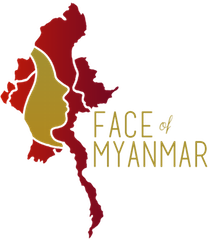Meet Nan Saai. He is a young Tai-Kun man, part of the Shan ethnic group, who speaks nearly fluent English.
Nan Saai chews on betel, a fragrant nut from the areca palm, as he props himself to stand.
A few things differentiate Nan Saai from most in his community. To start, he is fairly new to Thanaka. He began applying the paste at the age of twenty and simply wears a thin layer of readymade Thanaka because he believes that patterns and logs are “only for girls.” He is also an amputee and, as an unfortunate consequence of this, is unemployed.
His late start to using Thanaka can be easily explained. Nan Saai is from Yang Kwai, a tiny village nestled deep in the mountains near the Thai and Chinese borders. Because of the remoteness and rugged terrain of his native town and his Sino-Shan ethnicity, Thanaka is not a traditional practice. Rather, it was shared later in Nan Saai's life by his peers as a way to treat his adult acne and cool himself during hot season. His amputation, however, sheds light on some of the more deeply rooted issues in Myanmar.
Nan Saai was living the dream of many Shan youth. He graduated from a foreign university, Chiang Mai University, spoke English, and was gainfully employed as a construction worker in Thailand. He was not only living abroad but was successful enough that he could send money home to support his family. The problem was that he was also an immigrant and, as such, was uninsured and unprotected.
His dreams came crashing down in a motorcycle accident. Despite intelligence and education from a reputable university, his immigrant status in Thailand meant he was only employable as a common laborer. Badly injured and without recourse, Nan Saai’s life changed in an instant. He had lost his leg and thus lost his job.
After the accident, he was forced to return to Myanmar. The situation is equally grim in his hometown. He has no access to healthcare or prosthetics, no unemployment agency to provide temporary compensation, and little opportunity in a place that requires able-bodied individuals to work in the fields.He now aspires to push forward with his study of English as he says this is his best chance at being able to provide himself.
He now spends his days around his parents’ farm house, helping out where he can and applying Thanaka when it is hot.


